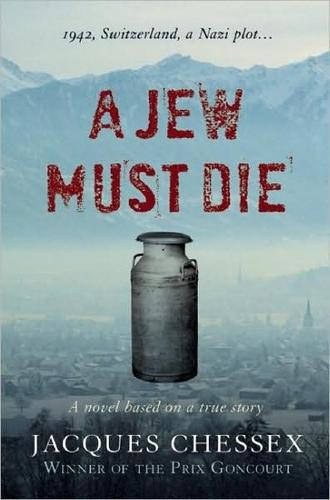
A Jew Must Die
کتاب های مرتبط
- اطلاعات
- نقد و بررسی
- دیدگاه کاربران
نقد و بررسی

February 15, 2010
Those interested in Nazi activity in neutral Switzerland during WWII will best appreciate this slight novella from Prix Goncourt winner Chessex (The Vampire of Ropraz
). In April 1942, in the small market town of Payerne, an anti-Semitic pastor incites a band of local Nazis “to set an example for Switzerland and for the Jewish parasites on its soil.” National Movement leader Fernand Ischi and his thugs target a representative Jew, cattle-dealer Arthur Bloch, whose murder will make a fine birthday present for Adolf Hitler. While this book generated controversy in Switzerland, where the country's role in WWII is still a sensitive issue, U.S. readers will find that it falls short of, say, Jerzy Kosinski's The Painted Bird
and other works that view the Holocaust through isolated instances of violence. Chessex (1934–2009), who was born in Payerne, was also an essayist, poet, and painter.

Starred review from April 15, 2010
Chessex, a prominent Swiss writer, died in 2009 at age 75. He was the first nonFrench citizen to win the Prix Goncourt, Frances most prestigious literary award. American readers of this particular novel, which is one of Chessexs many, will quickly understand why he was so honored. It is a swift and stunning narrative based on a true incident. In the Swiss town of Payenne (the authors hometown), in 1942, a group of Swiss Nazis kill a successful Jewish cattle trader. It was nothing personal, as it were, but rather an act of intimidation aimed at the Jewish community of Switzerland at large. This spare but heart-piercing novel illustrates the dementedness of Nazism (such a thing as total depravity, pure in its filth) as it captures the European mind-set of the 1930s and 1940s as people looked for scapegoats to blame for the hard economic times, which in turn made anti-Semitism and thus Nazism appealing. The writing is elegant, in provocative contrast to the human crudity and cruelty it depicts. (The atmosphere of the town is described this way: Dark currents flow unseen beneath the assurance and business bustle. Complexions are rosy or ruddy, the soil is rich, but covert dangers lurk.) Read this novel for the history it depicts and for the sheer beauty of its prose.(Reprinted with permission of Booklist, copyright 2010, American Library Association.)

























دیدگاه کاربران